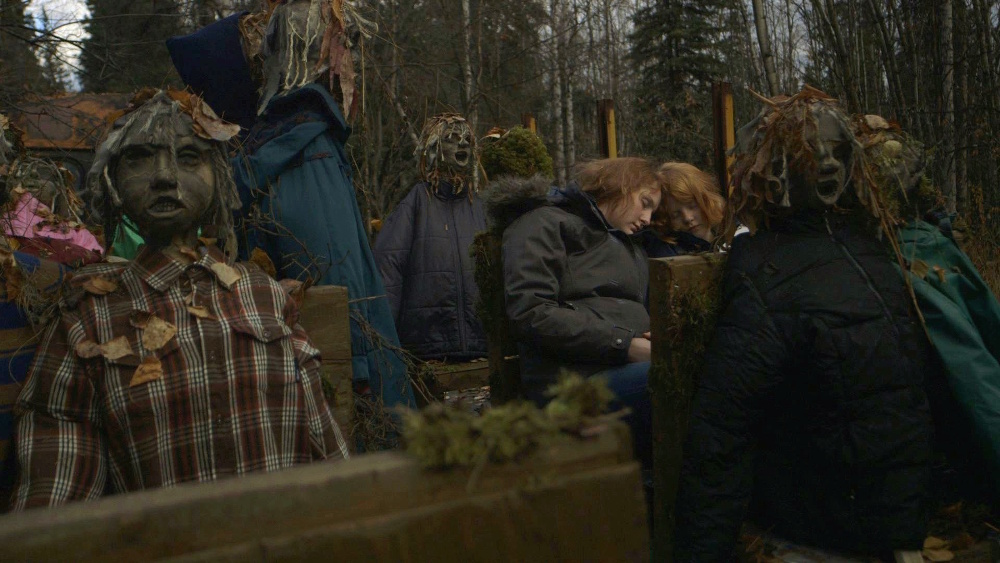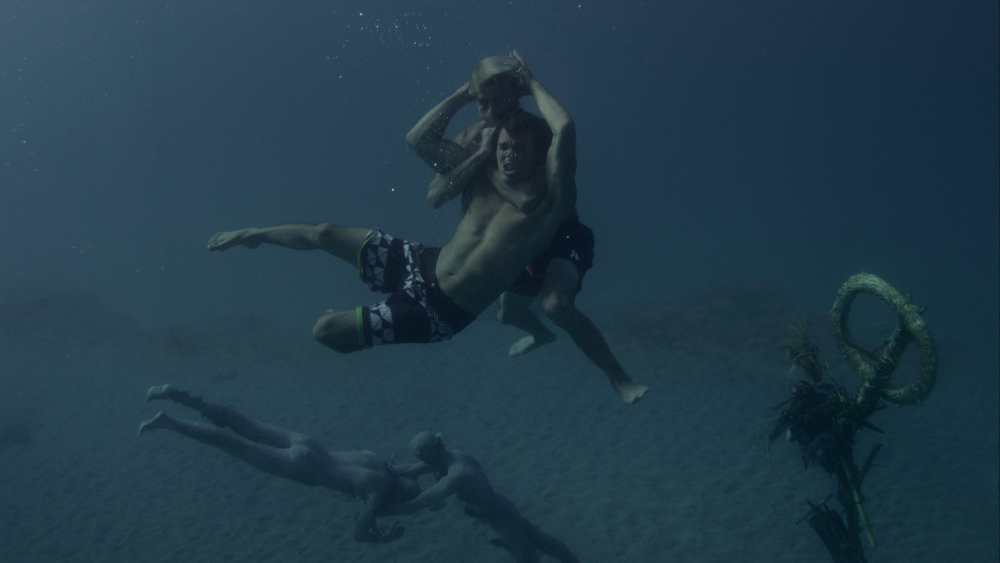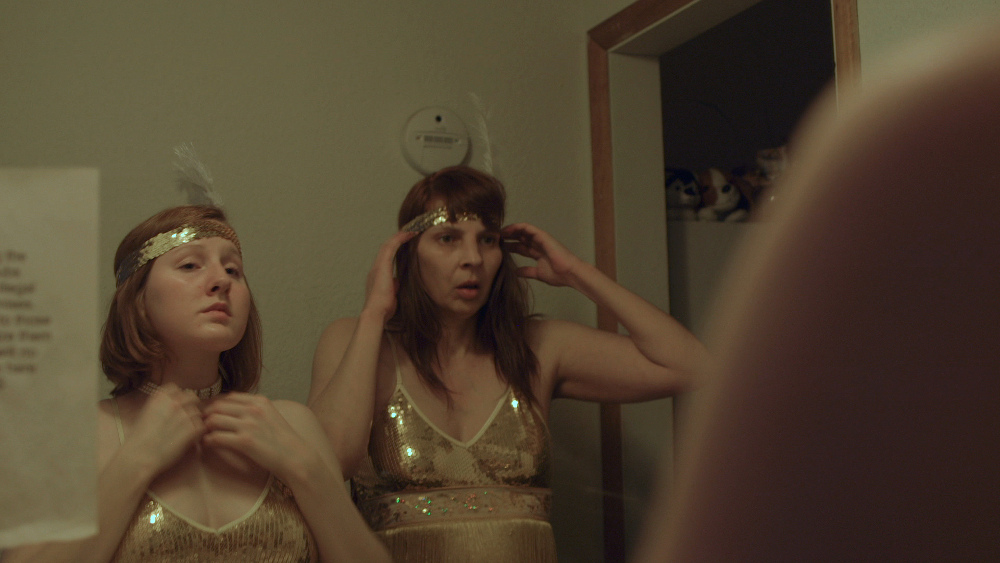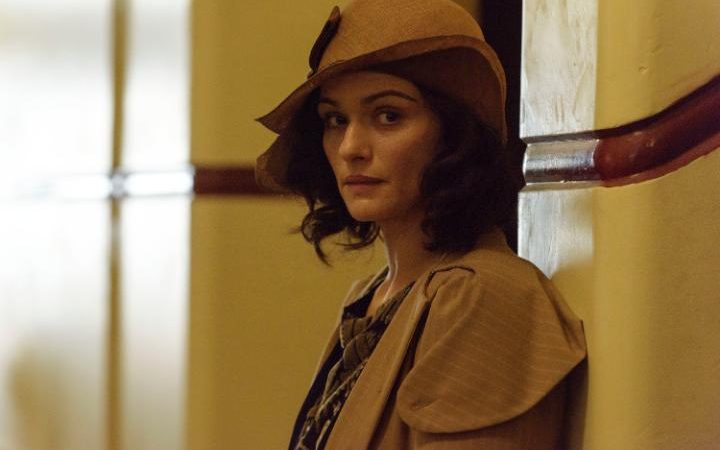What’s love all about anyway? That’s the almost certainly unanswerable question that Israeli-American director Alma Har’el sets out to tackle in her strange, feverish, at times downright hallucinatory documentary LoveTrue. The problem is, by the end of its alternately entertaining and disconcerting 80 minutes, you’ll almost certainly be none the wiser. And you may even have forgotten what the original question was anyway.
Har’el’s previous documentary Bombay Beach, on a ruined ghost town in southern California, earned high praise for its fantastical visuals and its blurring of reality and fiction. She takes a similar approach here, but to a far less effective end. LoveTrue is undeniably striking in its weird imagery and its free-flowing structure, but whether it ever really engages with its theme is another matter entirely.
Har’el’s romantic investigations focus on three relationships from the furthest corners of the US. Alaskan self-confessed "nerd girl" Blake gets a lot of self-confidence from being a stripper in a lap-dancing club, she says, but she’s worried her boyfriend, who has a rare and debilitating bone condition, is drifting away from her. Hawaiian surfer dude Coconut Willie – who scrapes a living from shinning up coconut trees to retrieve their fruit – discovers that the infant he’s raising is not his son, but rather the son of his petulant ex-girlfriend and best mate. And in New York, the gospel-singing (and they do it brilliantly) Boyd family are still reeling from their mother’s sudden departure, with husband John offering his own pseudo-philosophical understandings of what their romantic problems were. There are intriguing, contrasting perspectives on love here – and on the consequences when it breaks down. But Har’el seems reluctant to trust her subjects’ stories much, or even to tell them in a particularly clear or straightforward way. Instead, she seems to want to get inside her protagonists’ heads, to see the world from their individual perspectives – which might not give us many insights into love, even if it makes for some unforgettable visuals.
There are intriguing, contrasting perspectives on love here – and on the consequences when it breaks down. But Har’el seems reluctant to trust her subjects’ stories much, or even to tell them in a particularly clear or straightforward way. Instead, she seems to want to get inside her protagonists’ heads, to see the world from their individual perspectives – which might not give us many insights into love, even if it makes for some unforgettable visuals.
And when it works, Har’el’s dream-like sense of flow from scene to scene is a marvellous thing. As in an elegant segue from the pulsing Northern Lights to the gaudy neon of a cruddy Alaskan lap-dancing club. Or a downright creepy staging of a horrible bullying incident from Blake’s childhood, re-enacted on a bus lost in the woods that’s populated with sinister lifeless dummies (pictured above). Har’el’s blurring of fact and fiction, though not a new trick, is one of the film’s most fascinating conceits – and also one of its most troublesome. It’s fine when we know what we’re watching isn’t real – as in Willie’s elaborately choreographed underwater skirmish with (supposedly) his love rival (pictured above), which his story builds to. But at other times, truth and fictions are considerably less easy to tell apart – as in New Yorker John’s strange appearance on a cable TV channel, expounding his theories on love.
Har’el’s blurring of fact and fiction, though not a new trick, is one of the film’s most fascinating conceits – and also one of its most troublesome. It’s fine when we know what we’re watching isn’t real – as in Willie’s elaborately choreographed underwater skirmish with (supposedly) his love rival (pictured above), which his story builds to. But at other times, truth and fictions are considerably less easy to tell apart – as in New Yorker John’s strange appearance on a cable TV channel, expounding his theories on love.
LoveTrue is a film that wears its artifice proudly. It not only employs actors to play the younger and older versions of its main protagonists – signposting them with "Older Blake" or "Younger Willie" T-shirts – but also goes further in giving voice to those actors themselves, even allowing them conversations with the figures they’re meant to be playing. It’s all a bit head-turningly meta. But again, when it works, it’s a treat: arguably the film’s best thing is Snow (pictured below with Blake), the 49-year-old stripper drafted in to play an ageing Blake, but who soon takes on life in her own right to admit – heartbreakingly – that she’s no idea where her life is going. But for all the visual cleverness, the garish colours and the dreamlike connections, the stories Har’el is telling just don’t end up seeming that interesting – or at least she doesn’t probe them strongly enough to discover much empathy. By the end of LoveTrue, we don’t get to know (and therefore care) much about any of her trio of protagonists – are they there simply because they’re a bit kooky? In any case, Har’el doesn’t seem compelled enough by them to tell their stories simply and sincerely, other than as a framework for her own unbridled imagination. LoveTrue is a thoroughly entertaining and stylish 80 minutes of cinema, but whether it shines any new light on one of life’s great mysteries – well, that’s another matter entirely.
But for all the visual cleverness, the garish colours and the dreamlike connections, the stories Har’el is telling just don’t end up seeming that interesting – or at least she doesn’t probe them strongly enough to discover much empathy. By the end of LoveTrue, we don’t get to know (and therefore care) much about any of her trio of protagonists – are they there simply because they’re a bit kooky? In any case, Har’el doesn’t seem compelled enough by them to tell their stories simply and sincerely, other than as a framework for her own unbridled imagination. LoveTrue is a thoroughly entertaining and stylish 80 minutes of cinema, but whether it shines any new light on one of life’s great mysteries – well, that’s another matter entirely.

 There are intriguing, contrasting perspectives on love here – and on the consequences when it breaks down. But Har’el seems reluctant to trust her subjects’ stories much, or even to tell them in a particularly clear or straightforward way. Instead, she seems to want to get inside her protagonists’ heads, to see the world from their individual perspectives – which might not give us many insights into love, even if it makes for some unforgettable visuals.
There are intriguing, contrasting perspectives on love here – and on the consequences when it breaks down. But Har’el seems reluctant to trust her subjects’ stories much, or even to tell them in a particularly clear or straightforward way. Instead, she seems to want to get inside her protagonists’ heads, to see the world from their individual perspectives – which might not give us many insights into love, even if it makes for some unforgettable visuals. Har’el’s blurring of fact and fiction, though not a new trick, is one of the film’s most fascinating conceits – and also one of its most troublesome. It’s fine when we know what we’re watching isn’t real – as in Willie’s elaborately choreographed underwater skirmish with (supposedly) his love rival (pictured above), which his story builds to. But at other times, truth and fictions are considerably less easy to tell apart – as in New Yorker John’s strange appearance on a cable TV channel, expounding his theories on love.
Har’el’s blurring of fact and fiction, though not a new trick, is one of the film’s most fascinating conceits – and also one of its most troublesome. It’s fine when we know what we’re watching isn’t real – as in Willie’s elaborately choreographed underwater skirmish with (supposedly) his love rival (pictured above), which his story builds to. But at other times, truth and fictions are considerably less easy to tell apart – as in New Yorker John’s strange appearance on a cable TV channel, expounding his theories on love. But for all the visual cleverness, the garish colours and the dreamlike connections, the stories Har’el is telling just don’t end up seeming that interesting – or at least she doesn’t probe them strongly enough to discover much empathy. By the end of LoveTrue, we don’t get to know (and therefore care) much about any of her trio of protagonists – are they there simply because they’re a bit kooky? In any case, Har’el doesn’t seem compelled enough by them to tell their stories simply and sincerely, other than as a framework for her own unbridled imagination. LoveTrue is a thoroughly entertaining and stylish 80 minutes of cinema, but whether it shines any new light on one of life’s great mysteries – well, that’s another matter entirely.
But for all the visual cleverness, the garish colours and the dreamlike connections, the stories Har’el is telling just don’t end up seeming that interesting – or at least she doesn’t probe them strongly enough to discover much empathy. By the end of LoveTrue, we don’t get to know (and therefore care) much about any of her trio of protagonists – are they there simply because they’re a bit kooky? In any case, Har’el doesn’t seem compelled enough by them to tell their stories simply and sincerely, other than as a framework for her own unbridled imagination. LoveTrue is a thoroughly entertaining and stylish 80 minutes of cinema, but whether it shines any new light on one of life’s great mysteries – well, that’s another matter entirely. The narrative - ripe for parody - finds
The narrative - ripe for parody - finds